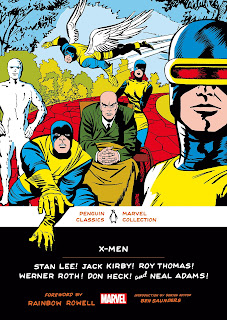X-Men (Penguin Classics Marvel Collection)
Stan Lee, Jack Kirby (Artist), Roy Thomas, Werner Roth, Don Heck, Neal Adams, Arnold Drake, Gary Friedrich, George Tuska, Ben Saunders (Editor), Rainbow Rowell (Foreword)
The X-Men were born when Stan Lee and Jack Kirby, Marvel's premiere creators of new superhero comics, noted that superhero teams such as the Fantastic Four were box-office, so why not start another one? Lee wrote
Then once I figured out what powers they'd have ... how did they get their powers? And they were all separate people that weren't connected to each other, so I knew that would be a helluva job. And I took the cowardly way out, and I figured, hey, the easiest thing in the world: they were born that way. They were mutants.
In a world in which nuclear weapons tests had in the recent past released lots of radioactivity in to the atmosphere, this appeared to make a lot of sense. As a card-carrying geneticist, I have to tell you that essentially nothing in the X-Men saga makes any kind of scientific sense.
In Lee and Kirby's hands the idea turned out to have legs. They did two things that gave the X-Men and their stories unexpected emotional depth. First, they gave some of the X-Men gifts that were hard to bear. For instance Rogue (who would not appear until 1981) cannot touch another person without hurting them.
Second, and this was the Big One, Lee and Kirby anticipated that Mutants would be met with the resentment of bigots. In this they were surely right. In fact, this resentment is not unfounded. The main villains of the X-Men are other Mutants who think themselves entitled to rule over inferior Homo sapiens. Eventually the X-Men franchise came to be seen as a model of prejudice and social injustice. In his Introduction, editor Ben Saunders casts doubt on this interpretation, but it strikes me that, even if Lee and Kirby had no such idea at first, the franchise gradually grew into it. If oppressed readers and movie viewers see themselves in the X-Men, who has the right to tell them they are wrong?
Eventually (1968) Lee and Kirby stepped away from the X-Men, handing it off to new writers and artists. As usual (I am learning as I work my way through the Penguin Classics Marvel Collection), this hand-off to younger artists was accompanied by a burst of creativity -- the last comics in the book are the best. In 1970 Marvel canceled the X-Men, and that is where this collection ends.
The X-Men would return to the comics in 1975 and in the 1980s became Marvel's best-selling titles. And of course in 2000 the first X-Men movie appeared -- the franchise now totals fourteen movies (including the recently released Deadpool and Wolverine).
X-Men is a fairly good entry in the Penguin Classics Marvel Collection -- second only to The Amazing Spider-Man among the four I have so far read.


Comments
Post a Comment
Add a comment!